Exploring the vibrant flavors of Korean cuisine has never been more accessible. This hands-on cooking class offers an immersive experience, guiding participants through the creation of three authentic dishes. Beginning with a tour of the nearby Mangwon Market, the class delves into the traditional ingredients that shape this beloved culinary tradition. Under the watchful eye of an expert instructor, you will then transform these market-fresh ingredients into a delectable feast, learning intricate techniques and gaining insights into the rich history and traditions behind each dish. With a professionally designed cookbook in hand, the journey continues long after the last bite is savored.
Key Points
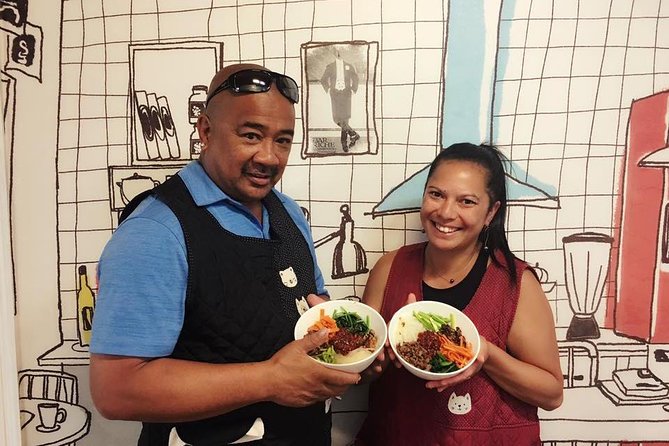
- Participants embark on a guided tour of Mangwon Market to learn about traditional Korean ingredients and their significance in the cuisine.
- Under expert instruction, participants prepare three authentic Korean dishes, such as soft tofu stew, bibimbap, and bulgogi, at individual cooking stations.
- The class provides insights into the rich history and traditions that shape Korean culinary culture, including the importance of fermented foods like kimchi.
- Participants receive a professionally designed cookbook with recipes, ingredient details, and techniques to continue their culinary journey and share the flavors of Korea at home.
- The 3-hour class, priced at €67.29 per person, includes a meal featuring the dishes prepared during the session and accommodates a maximum of 13 participants.
Overview of the Cooking Class
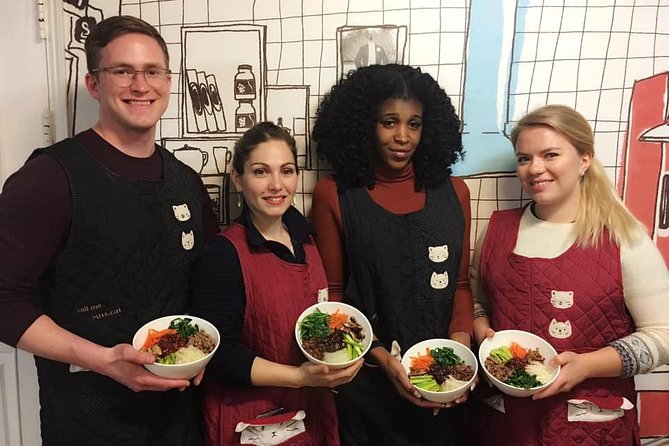
The cooking class offers participants the opportunity to learn how to prepare three authentic Korean dishes over the course of a 3-hour session.
The experience begins with a tour of the nearby Mangwon Market, where the instructor will introduce students to the local ingredients used in Korean cuisine.
Afterwards, the class reconvenes at the cooking studio, where each participant has their own personal cooking station equipped with everything needed to create the dishes.
The menu may include favorites like soft tofu stew, bibimbap, bulgogi, kimchi stew, japchae, or stir-fried pork.
At the end of the class, students will receive a professionally designed cookbook to take home and recreate the recipes.
Ready to find more treasures? More shopping adventures we recommend in Seoul
Exploring Mangwon Market
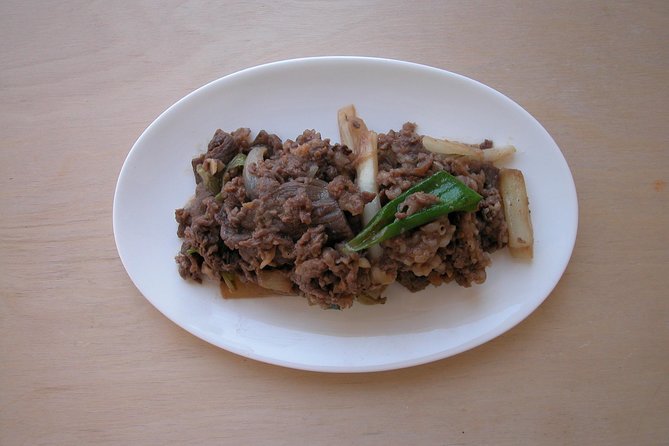
After introducing the class to Korean cuisine, the instructor leads participants on a guided tour of the nearby Mangwon Market.
This bustling local marketplace offers an inside look at the fresh ingredients and vibrant culture that form the foundation of authentic Korean dishes.
Wandering through the stalls, the group learns about traditional produce, spices, and condiments used in Korean cooking. The instructor highlights the importance of quality, seasonal ingredients, pointing out the farmers and vendors who supply the cooking class.
Participants eagerly explore the market, touching, smelling, and even tasting some of the unique offerings. This interactive experience provides valuable context and inspiration for the hands-on cooking to come.
Preparing the Korean Dishes
Back at the cooking studio, participants eagerly don their aprons and gather ’round their personal cooking stations, primed to transform the market-fresh ingredients into a trio of authentic Korean dishes.
Under the expert tutelage of the instructor, they explore the preparation of the day’s menu, which may include specialties like soft tofu stew, bibimbap, or the savory bulgogi.
With focused attention, they chop, sauté, and simmer, learning the intricate techniques that bring out the bold flavors of Korean cuisine.
As the aromas fill the air, a sense of accomplishment grows, and participants look forward to savoring the fruits of their culinary labors.
Learning About Korean Food Culture
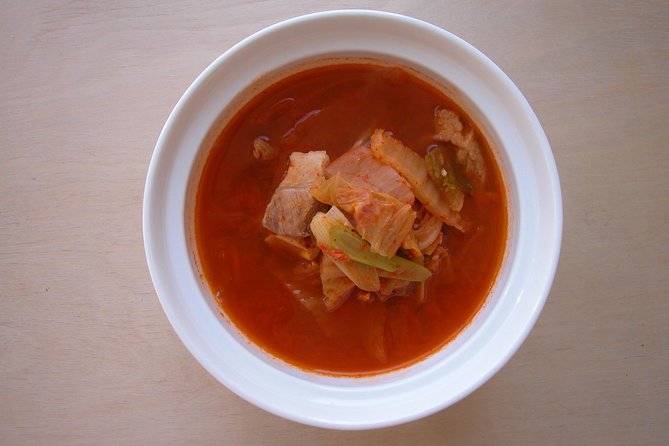
Participants’ immersion in Korean food culture deepens as the instructor shares insights into the rich history and traditions that have shaped the nation’s celebrated culinary landscape.
From the origins of iconic dishes like bibimbap and bulgogi to the significance of fermented foods like kimchi in the Korean diet, the instructor provides a rundown of the cultural and historical context that has influenced Korean cuisine.
Learners gain a newfound appreciation for the complexity and nuance of Korean flavors, as well as the importance of quality ingredients and meticulous preparation techniques.
Throughout the class, the instructor encourages participants to engage in lively discussions, fostering a deeper understanding and connection to the vibrant food culture they’re exploring.
Individual Cooking Stations
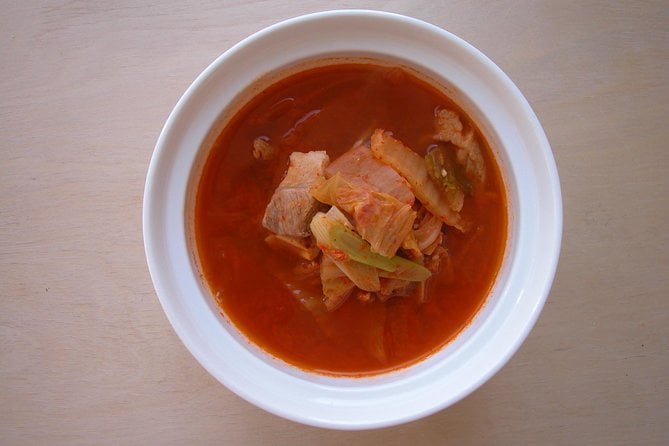
Upon returning to the cooking studio, each participant is provided with their own personal cooking station, complete with all the necessary tools and equipment to prepare the authentic Korean dishes. These individual stations allow everyone to actively engage in the cooking process, following the instructor’s guidance step-by-step. Each station includes a cooktop, utensils, and a selection of fresh, locally-sourced ingredients.
This setup encourages hands-on learning and enables participants to fully enjoy the traditional cooking techniques. The intimate class size ensures personalized attention and the opportunity to ask questions, ensuring everyone feels confident in their ability to recreate the dishes at home.
The individual stations create an engaging and interactive learning environment.
Here are more great tours and experiences we've reviewed in Seoul
Professionally Designed Cookbook
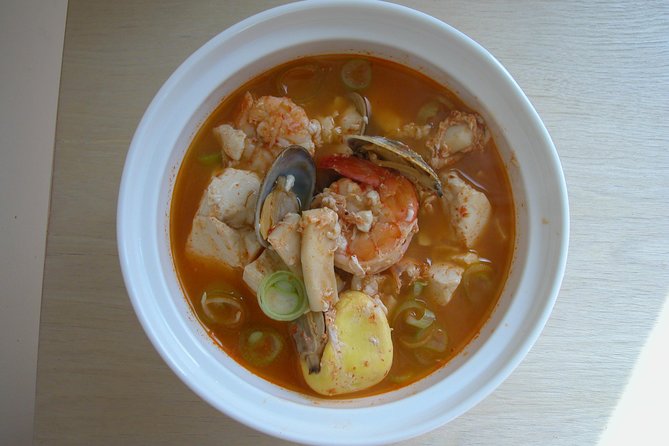
The participants walk away from the class with a professionally designed cookbook, packed with the recipes they’ve just mastered and a wealth of information about Korean cuisine and culture. This comprehensive guide serves as a memento of the hands-on experience and a resource for recreating authentic Korean dishes at home. The cookbook includes:
| Section | Contents |
|---|---|
| Recipes | Step-by-step instructions for the 3 dishes prepared in class |
| Ingredients | Detailed lists of the fresh, local ingredients used |
| Techniques | Explanations of Korean cooking methods and traditions |
| History | Background on the origins and significance of the dishes |
With this invaluable keepsake, students can continue their culinary journey and share the flavors of Korea with friends and family.
Inclusions and Pricing
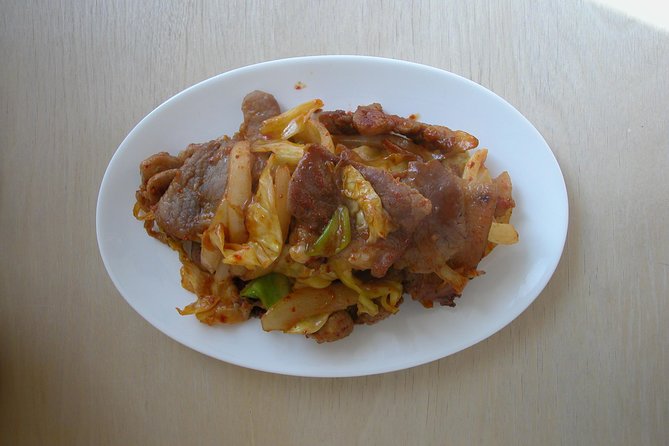
The cooking class includes a lunch or dinner featuring the three authentic Korean dishes prepared during the session, along with beverages. Participants also receive individual cooking stations, cookers, and fresh local ingredients to use throughout the hands-on experience.
Plus, they take home a professionally designed cookbook packed with the recipes, ingredient details, cooking techniques, and historical information covered in the class.
The class is priced at €67.29 per person and is limited to a maximum of 13 travelers.
The meeting point is Exit 2 of the Mangwon subway station in Seoul, South Korea, and the class returns to the same location at the end.
Confirmation is received at the time of booking, and the experience isn’t wheelchair accessible but is stroller accessible.
Location and Meeting Point
The cooking class begins at the meeting point of Exit 2 of the Mangwon subway station in Seoul, South Korea. From there, the group will explore the local Mangwon Market to gather fresh ingredients for their authentic Korean dishes. After the market tour, the class will return to the cooking studio, which is conveniently located near the meeting point.
| Meeting Point | End Point | Transportation |
|---|---|---|
| Exit 2 of Mangwon subway station (line 6) | Returns to the meeting point | Near public transportation |
The convenient location and accessibility of the class makes it easy for participants to join and complete the culinary experience. With the market tour and hands-on cooking, this class offers a unique opportunity to take in Korean food culture.
Frequently Asked Questions
Can Vegetarian or Vegan Options Be Accommodated?
Yes, vegetarian and vegan options can be accommodated for this cooking class. The instructor is able to modify the menu to include plant-based dishes that align with dietary restrictions or preferences.
Is the Class Suitable for Children or Families?
The class appears suitable for children and families, as it has a maximum of 4 people per session and allows strollers. The hands-on cooking and market tour format could be engaging for both kids and adults.
What Is the Cancellation Policy if I Need to Reschedule?
The cancellation policy allows for full refunds if you cancel at least 24 hours before the class. Rescheduling is also possible, though subject to availability. Fees may apply for last-minute changes or cancellations.
Can I Bring My Own Recipes or Ingredients to the Class?
Participants are generally expected to use the class’s provided recipes and ingredients. However, the instructors may accommodate special requests or dietary needs if notified in advance. It’s best to check with the organizers about any substitutions or customized options.
Are There Any Special Requirements for the Cooking Stations?
The cooking stations are individual and equipped with necessary tools and appliances. Students don’t need to bring any special requirements, as the class provides all the fresh local ingredients and equipment needed to prepare the authentic Korean dishes.
Recap
Enjoy the vibrant flavors of Korea with this hands-on cooking class.
Guided by an expert instructor, you’ll explore a local market, transform fresh ingredients into authentic Korean dishes, and learn about the rich history and traditions behind the cuisine.
With personalized cooking stations and a professional cookbook to take home, you’ll leave with a deeper understanding and appreciation for the complexity of Korean flavors.
More Shopping Tours in Seoul
- Seoul: Full-Day Royal Palace and Shopping Tour
- Korean Shamanism Walking Experience and Shopping in Seoul
- Private Full Day Tour Anseong Farm Land With Gwangmyeong Cave
- Insadong / Gyeongbok Palace / Hanok Village / Gwangjang Market (Korea Day Tour)
- Korean Shamanism Walking Experience and Shopping in Seoul
- Private Full Day Tour Anseong Farm Land With Gwangmyeong Cave
More Tours in Seoul
More Tour Reviews in Seoul
- Private Tour Rail Bike & Nami Island & (Petite France or Garden of Morning Calm)
- Insadong Makgeolli Taster Tour
- Day Trip to Yongin Daejanggeum and Korean Folk Village From Seoul
- Seoraksan Daecheongbong(1,708m) Peak Hiking [1-Day Tour From Seoul]
- Hwadamsup, Luge and Korean Folk Village One Day Tour/Shuttle Bus
- Summer Season Round Trip for Seorak Mountain and Surfy Beach
Not for you? Here's more things to do in Seoul we have recnetly reviewed
- 9 Best BBQ Experiences In Seoul
- 25 Best Food Tours In Seoul
- 20 Best Full-Day Tours In Seoul
- 5 Best 2 Day Tours In Seoul
- 2 Best 3 Day Tours In Seoul
- 2 Best 4 Day Tours In Seoul
- 10 Best Photography Experiences In Seoul
- 15 Best Dining Experiences In Seoul
- 11 Best Dinner Tours In Seoul
- 11 Best Lunch Experiences In Seoul
- Moonlight Stroll at Seoul Palace
- Hello Hanbok
